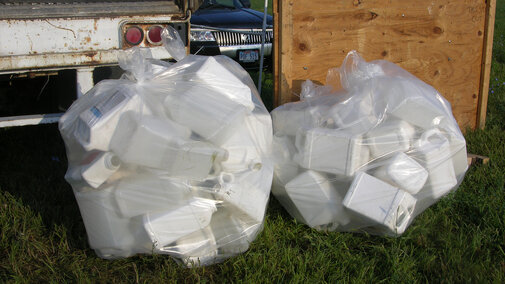Nebraska’s private and custom pesticide applicators care deeply about the land and its resources, and they take seriously their responsibility to be stewards of the environment. Pesticides are a critical tool in agricultural pest management, but they must be handled with care — from purchase to disposal — in order to reap their benefits while minimizing their risks.
According to the U.S. Geological Survey, tens of millions of pounds of pesticides are applied in Nebraska each year. That translates to a lot of empty plastic containers. The Nebraska Pesticide Container Recycling Program, now in its 30th year, provides a way for private and commercial applicators to safely and responsibly dispose of their pesticide containers, free of charge.
COVID-19 remains a concern in 2021, and individual collection sites will have the final say on how they wish to operate. For the safety of their employees and those dropping off containers (recyclers), collection sites may take steps such as requiring that masks be worn.
A list of collection sites can be found on UNL’s Pesticide Safety Education Program site. Please note each site’s collection schedule.
The program accepts only containers that held pesticides for crop, ornamental/turf, forestry, aquatic and public health pest control. Containers that held crop oils, surfactants and adjuvants are also accepted. Containers that held consumer pesticides (e.g., home and garden products) are not accepted. (Some cities or counties offer household hazardous waste disposal events for these types of products.)
All collection sites in Nebraska accept 1- and 2.5-gallon plastic containers. In addition, some sites accept 15-, 30-, and 55-gallon plastic drums. Check the list of sites for details.
Collection site managers thoroughly inspect containers before accepting them for collection, so if you plan to recycle containers, be sure to prepare them beforehand.
Preparing Containers
Before dropping them off at a collection site, you must triple- or pressure-rinse each container according to label directions. It is best to do this at the time of the application, as rinsate can be safely added to a tank load and used as spray. Delayed rinsing can result in dried residue in containers that is difficult to remove. The NebGuide, Rinsing Pesticide Containers (G1736), details the purpose, benefits and process of rinsing containers.
With the exception of materials that are glued to containers, remove and discard any labels, booklets and slipcover plastic. Caps cannot be recycled; rinse all caps and discard them as regular trash.
About the Program

The Agricultural Container and Recycling Council (ACRC), which oversees container recycling nationwide, is a not-for-profit organization funded by manufacturers and distributors of crop protection products. ACRC reports that nearly 9 million pounds of plastic were collected nationally in 2020, putting the historical total at some 217.3 million pounds collected since 1992.
ACRC’s Midwest contractor, G. Phillips & Sons, collected 74,560 pounds of containers in Nebraska in 2020, despite the pandemic. This is approximately 10% more than the 67,688 pounds collected in 2019. Since the program’s inception, more that 2.5 million pounds have been collected in Nebraska for recycling. That is equivalent to the weight of more than eight Statues of Liberty (National Park Service).
Recycling is the most sustainable, environmentally friendly method of container disposal. The plastic from recycled containers is used to make industry-approved products such as pallets, drain tile, underground utility conduit, landscape edging and nursery pots. Instead of adding them to a landfill, consider recycling your empty pesticide containers this year.

